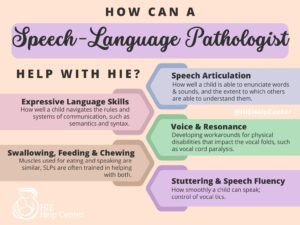 Many children with hypoxic-ischemic encephalopathy also have speech delays or disorders that impact their ability to form words, speak clearly, or process language. Speech-language pathology is one resource that parents can turn to for help with their child’s speech development.
Many children with hypoxic-ischemic encephalopathy also have speech delays or disorders that impact their ability to form words, speak clearly, or process language. Speech-language pathology is one resource that parents can turn to for help with their child’s speech development.
Speech-language pathologists (SLPs) are highly trained professionals that can help children develop their communicative skills. They can also help selective augmentative and adaptive communication (AAC) technologies to help individuals who are nonverbal.
SLPs can be found hospitals, though the overwhelming majority are employed by local schools and school districts. Some can also be found in local physical therapy offices and long-term care facilities.
How Can a Speech-Language Pathologist Help?
 Speech-language pathologists (SLPS, or speech therapists) primarily work with children who have trouble articulating or understanding speech. They also play a critical role in helping children with certain motor disorders learn how to eat, chew and swallow, as the muscles of the face, neck and throat play critical roles in all of these tasks. Their roles are often fairly broad, and encompass such varied areas as:
Speech-language pathologists (SLPS, or speech therapists) primarily work with children who have trouble articulating or understanding speech. They also play a critical role in helping children with certain motor disorders learn how to eat, chew and swallow, as the muscles of the face, neck and throat play critical roles in all of these tasks. Their roles are often fairly broad, and encompass such varied areas as:
Speech Articulation and Intelligibility
How well a child is able to physically produce words and sounds, as well as how well other people are able to understand them.
Expressive Language Skills
How well a child can navigate the rules and systems governing communication, such as semantics and syntax.
Receptive Language and Listening Skills
How well a child listens to and understands language.
Stuttering and Speech Fluency
How smoothly a child can speak; control of vocal tics.
Voice and Resonance
Developing workarounds for physical differences that impact the vocal folds, such as vocal cord paralysis.
Social/Pragmatic Language
How a child changes their language in response to different social situations and settings, follows the rules of conversation and communicates for different purposes.
Cognitive-Communication Skills
Communication skills based in cognitive processes; SLPs can help children build compensatory strategies to help overcome some speech difficulties.
Augmentative and Alternative Communication (AAC)
Systems of communication that can supplement or relate verbal speech for those who cannot speak verbally.
Swallowing, Feeding and Chewing
Because the muscles used for eating and speaking are similar, SLPS are often trained to help with both.

